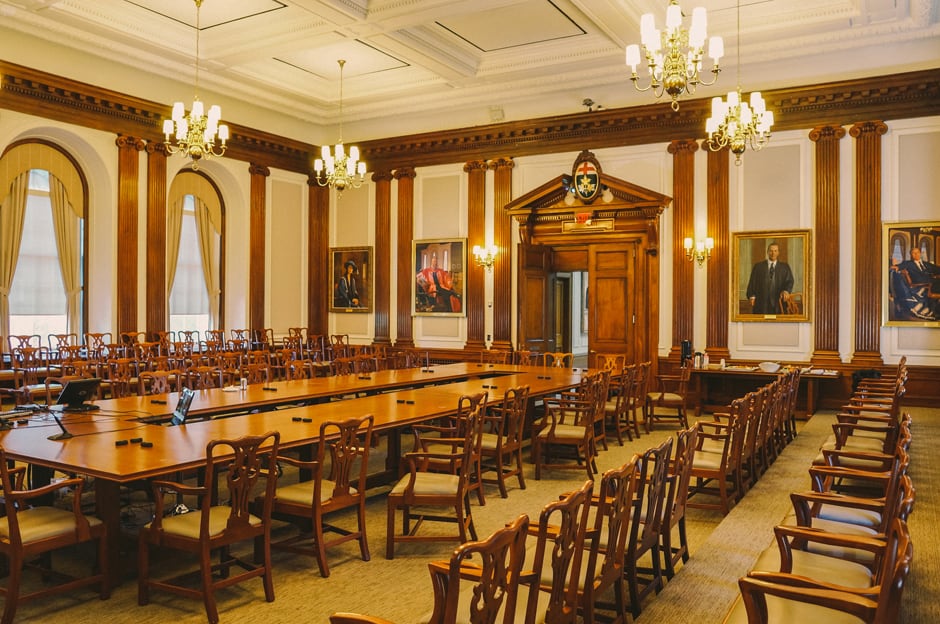Approval of the proposed Student Commons may soon be put to Governing Council.
Althea Blackburn-Evans, U of T director of media relations, said that provost Cheryl Regehr will “be recommending to the Executive Committee that it consider whether the time has come to put the Student Commons Agreement on the agenda for consideration by Governing Council this fall.”
The Student Commons is a planned student-run building that would be home to campus clubs, eateries, multi-faith spaces, and work and meeting spaces. The building, which will be located at 230 College Street, was originally slated to open in fall 2015.
St. George students currently pay construction costs for the space as part of their annual fees. The $8.20 fee was approved in a referendum held in 2007. According to Pierre Harfouche, University of Toronto Students’ Union (UTSU) vice-president, university affairs, the universiy holds all funds for the building.
However, final approval by Governing Council, which is required for construction to commence, was postponed in June 2013. Blackburn-Evans said that this was motivated by the need for the UTSU and various divisional student societies to resolve outstanding disputes.
The disputes revolve around what Misak referred to in a 2013 report as “an ongoing series of complaints and frustrations on the part of some divisional student societies towards the University of Toronto Students’ Union.”
Three of these societies, the Trinity College Meeting (TCM), the Victoria University Students’ Administrative Council (VUSAC), and the Engineering Society (EngSoc) previously held referenda among their membership that supported no longer paying fees to the UTSU.
Concerns with progress
Student societies have already raised a number of concerns with the project, including the planned allocation of space within the commons.
“The main concern is that of neutrality,” said VUSAC resident Rowan DeBues, adding: “Given how negative relationships have been with the UTSU, I see the Student Commons as another potential area of conflict if it is mishandled.”
Representatives of the UTSU expressed optimism that the Student Commons would be completed.
“The Commons will be built due to obligations that both the university and the students’ union must uphold,” said Cameron Wathey, vice-president, internal and services, adding: “At this point, we have been discussing with clubs what the plans currently are, and ensuring that they have an opportunity to voice their concerns about the lack of space on campus.”
Representatives from various divisional societies were less optimistic. “The issue is far from being sorted out,” said Kaleem Hawa, chair of the TCM.
“The UTSU’s drive to remove college and professional faculty representation from their Board of Directors and to potentially remove online voting from the upcoming election is a signal that they don’t take their responsibilities as our student union seriously,” he added.
Hawa also criticized the UTSU for its “unwillingness to act in an accountable and democratic fashion.”
EngSoc president Teresa Nguyen echoed Hawa’s sentiment, saying that the UTSU has “still made no efforts to acknowledge EngSoc’s requests for more transparent operations back in 2010.”
DeBues said that the Student Commons fee is especially frustrating for Victoria College students, who also still pay towards the college’s Goldring Student Centre as well.
“Progress is being made, though not through the UTSU… We have talked with the vice-provost, Jill Matus, and Governing Council in trying to improve the situation,” DeBues said.
The path forward
Some students have taken steps to help expedite the planning process. For example, Hawa submitted a motion to the UTSU Annual General Meeting (AGM) that would require all potential members of the Student Commons management committee to declare conflicts of interest, including club affiliations.
“This would mean that UTSU-appointed candidates will have to declare any connection to campus clubs — in the form of executive membership or endorsements — and recuse themselves from voting on space allocation for those organizations. This should make space allocation fair and representative,” he said.
DeBues and Harfouche also called for more student engagement to resolve outstanding issues. “It is your money, and you have every right to see returns on your investment,” DeBues said.
“Students looking at moving this project forward should get informed on the root causes of the issues behind the approval of the student commons,” Harfouche added, calling on students to attend the UTSU AGM.
Correction: An earlier version of this article incorrectly referred to provost Cheryl Regehr as provost Cheryl Misak.


